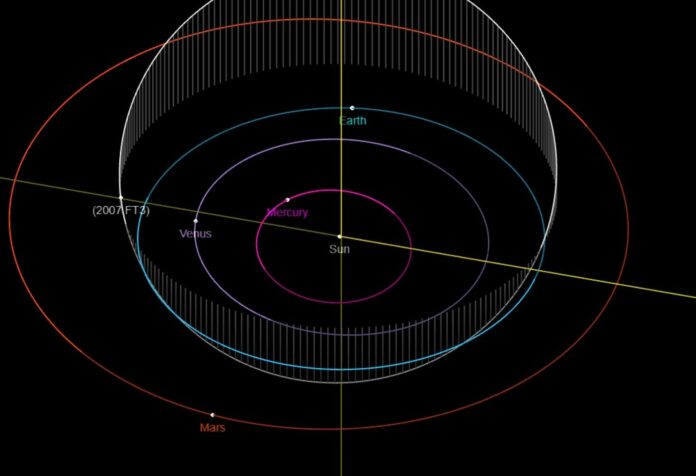Here’s Everything You Need to Know About The Asteroid That May Smash Into Earth This Year, According to NASA
NASA believes the chances are low, but the effect cannot be ruled out totally.
Since its discovery 16 years ago, asteroid 2007 FT3 has been in the headlines regularly.
What’s the reason?
Which has a small but not nil possibility of crashing with Earth at some time. NASA scientists provided many possible dates.
Dates when nothing occurred at all.
However, the asteroid is once again in the spotlight as the next opportune moment for a potential impact looms on October 5 of this year. If such an impact were to occur, the asteroid, with a diameter exceeding 300 meters, could unleash an explosion equivalent to 2.6 billion tons of TNT.
The question remains: Is this scenario likely to unfold?
Examining the available data, it is confirmed that the asteroid does exist and is listed in NASA’s Sentinel system as a potentially hazardous object. It is classified as a ‘lost asteroid,’ observed only 14 times over a brief 1.2-day period as it traced its orbital path before disappearing from astronomers’ instruments, leaving little time for in-depth study.
Nevertheless, it has been determined that the asteroid has a diameter of approximately 315 meters, and its orbit could bring it into collision course with Earth during one of its approaches.
The Center for Near-Earth Object Studies has identified 89 potential impacts, including the one on October 5.
The most critical moment of concern transpired four years ago on October 3, 2019, when 2007 FT3 was predicted to have its closest approach to Earth. However, no impact occurred.
The next period of relative risk will occur in early October of this year, followed by another on March 3, 2030, but NASA predicts that neither will occur.
Unsettling news
Despite alarmist reports on various news outlets and internet sites predicting imminent catastrophe, NASA asserts there are no known impact threats “at any time in the next century.”
“There are no known asteroid impact threats to Earth at any time in the next century. Nasa and its partners diligently watch the skies to find, track, and categorize asteroids and near-Earth objects (NEOs), including those that may come close to Earth,” a NASA spokesperson told The Standard.
“An important note here is planetary scientists define asteroid approaches that come within 30 million miles of Earth’s orbit as close approaches. The larger an asteroid is, the easier it is for our planetary defense experts to find, meaning that their orbits around the sun are usually very well-known and understood for years or even decades.”
Astronomers continually monitor asteroids and near-Earth objects, focusing on those within about 48 million km, considering them ‘close’ with an acceptable safety margin.
The only question with 2007 FT3 is that it could not be studied for a long enough time to precisely estimate its trajectory.
Astronomers hope to rediscover or locate it on a photographic plate, enabling a more accurate orbit calculation and, based on the findings, either removing it permanently from the list of potentially dangerous asteroids or preparing for necessary diversion measures in a worst-case scenario.
Image Credit: JPL/NASA
